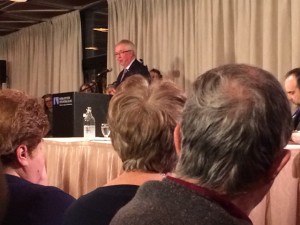It was Friday-on-a-Thursday QP in the Commons, in advance of the two-week Easter break. Justin Trudeau was away, as were many ministers, starting to fan out across the country to sell the budget to Canadians, but Bill Morneau was present, and expects to be the star of the show. Rona Ambrose led off, mini-lectern on neighbouring desk, and she railed about the “betrayal” of the middle class. Morneau insisted that there were plenty of measures to help families. Ambrose bemoaned the size of the deficit, and Morneau returned with a dig about the previous decade of low growth. Ambrose asked which taxes the government planned to raise, but Morneau didn’t bite, praising the measures therein instead. Denis Lebel took over, lamenting the lack of a plan to balance the budget. Morneau praised the plan to grow the middle class. Lebel closed by repeating the question on the size of the deficit, but got the same response. Thomas Mulcair was up next, recalling Air Canada breaking the law regarding their maintenance contracts, and now the government was retroactively changing that law. Marc Garneau responded that the situation had evolved, and Air Canada had made new commitments to create new jobs in Quebec and Manitoba. Mulcair read some condemnation that the deal was “Orwellian,” and that the Liberals were letting the rich get off the hook, but Garneau repeated his answer about changing situations and competitiveness. Mulcair thundered about the government not respecting a Human Rights Tribunal on equal investment for First Nations children. Carolyn Bennett said that they were making investments, but the systems had to change as well. Mulcair then failed about a plan to outsource Shared Services jobs, but Judy Foote responded that the publicized report was from 2014, which they did not intend to follow.
Tom Mulcair straight yelling in question period like his job depends on it.
(Which it might)
— Paul McLeod (@pdmcleod) March 24, 2016


